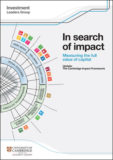The Investment Leaders Group found that the data necessary to assess the social and environmental impact of funds is lacking. While investment performance is regularly reported and standardised, sustainability performance is not, preventing savers from making informed investment choices. A common approach to reporting investment impact would improve the credibility of investment managers’ impact claims, allow comparability across funds and build trust along the entire investment value chain.
Using limited existing data, members of the Investment Leaders Group, convened by the University of Cambridge, developed and tested simple measures to rate the sustainability of different funds on a scale from “very negative” to “very positive”.
The Cambridge Impact Framework, published today in the report, In search of impact: Measuring the full value of capital, provides a dashboard to help the industry assess against outcomes such as “climate stability” and “decent work”.
The authors warned that even with the metrics published today, we are still at the very early stages of being able to understand the full sustainability impacts of financial services.
Members of the Investment Leaders Group, a global network of pension funds, insurers and asset managers that represent more than $4 trillion under management, tested the framework using practical metrics for six outcomes derived from the 17 Sustainable Development Goals: resource security, healthy ecosystems, climate stability, basic needs, wellbeing and decent work.
Current data allowed the members to assess decent work, for example, only according to total number of employees rather than whether these jobs were associated with positive working conditions, contracts and pay and whether they were created in areas with high unemployment, the authors said.
When it came to measuring resource security, the best information available to the industry at scale was total net waste. But the ideal metric would explore losses of products into the environment as well as toxicity and scarcity of materials within a circular economy.
The authors described the report as an open invitation to the investment industry to gather, clean, share and standardise the data needed to gain useful insights into the real world impact of funds.
Dr Jake Reynolds, Executive Director at the Cambridge Institute for Sustainability Leadership, said:
“The poorly developed state of impact data today should be a call to action for the whole investment value chain. The reality of environmental and social disclosure is that we struggle to answer one of the most basic questions that can be asked about a fund: Is it doing harm or good? Make no mistake, however: market demand for funds telling a credible story about social and environmental impact is increasing, and will favour early adopters.”
Roelie van Wijk, Global Head of Responsible Business & Public Affairs at Aegon Asset Management and also chair of the ILG, said:
“The ideal metrics are offered as a guide to how impact could be measured in years to come when the investment industry has developed the necessary data infrastructure. The base metrics, even if imperfect, are designed to help investors start that journey. Both sets are intended to provide the starting point for objective, comparable, consistent and reproducible results.”
Nicolas Faller, Co-CEO, Asset Management of Union Bancaire Privée (UBP), said:
“There is increasing demand, especially among millennials and the incoming Generation Z, for reporting social and environmental impact. However, the level of detail expected does not typically extend beyond that of an overview of the main environmental and social characteristics of a fund, with more in-depth information lacking. Ultimately the aim of this work is to help financial consumers – the investing public – choose the services they want based on a fuller understanding of the social and environmental impacts those choices will have.”




